
Chicxs Rockerxs SELA or CRSELA is celebrating their 10th anniversary of girls, trans and gender expansive youth camp. Photo by Melisa Ramirez.
Imagine a camp where East L.A. punk icon Alice Bag teaches a songwriting workshop to young kids and teens.
Actually, it’s not necessary to imagine, because it already happened, nine years ago. “It was a life changing experience,” is what Lili Montero remembers from her first day volunteering at the Chicxs Rockerxs SELA or CRSELA camp.
“I remember seeing Alice Bag and seeing the kids and everybody,” Montero said. “The energy was so intense that I had to walk out and cried in the hallway because I was just like, ‘Oh my God, I've never been in a space like this!” Montero said she felt overwhelmed about being there because “being a rockera, being someone that has dyed hair with piercings, being in a space that everybody else looked like me, that was Brown, that was speaking Spanglish that, all these parts of self, felt so seen and validated at camp.” She knew she wanted to be a part of the camp forever.
This will be the 10th year that CRSELA will be hosting a summer camp. Montero has been volunteering for nine years and has seen the many ways the camp has impacted not just the kids but also the volunteers.
“The vibe, the space has kind of always been the same. But I think the biggest growth has been the growth of the participants, whether they're campers or volunteers.” she said. “Now there's even more intergenerational friendships. We see new volunteers coming out, they're in their early 20s, you have some of those in their 30s and 40s… [and] yeah, we're mentoring the campers, but we're also sort of mentoring each other or helping each other.”
CRSELA is not the first rock camp to exist, but it is the first one to serve the Southeast LA communities. According to Erica Flores, the first girls rock camp started in Portland, Oregon in 2001. Flores helped establish Rock ’n’ Roll Camp for Girls Los Angeles in 2010, which is a separate camp from CRSELA.
Montero and I go way back. Except we don’t.
We’ve crossed paths within the rockero scene in L.A. but this is the first time that I was able to sit down and talk to her over video. Montero used to host rock segments for LATV and she is well known in the rockero world as “Lili from the pit,” reporting from the mosh pits of rock en español bands. She now works behind the scenes in the production field, where it can be very male dominated. She said volunteering with CRSELA provides her the opportunity to be in a gender expansive space.
CRSELA started as a rock camp for girls and has expanded to include trans and gender expansive youth. Montero recalled that when she first started volunteering, “We weren't even talking about gender expansive and non-binary folks to the degree that we are now.”
At the camp, Montero helps kids document their experience through video. This year, she is also working on a documentary to feature the camp’s history.
“We just wanted to document what’s happening at camp, because parents aren’t allowed.”
The reason is to give kids a space to be themselves, she said. “The reason why parents, legal guardians, adults, loved ones, aren’t allowed is that sometimes, even if they're being supportive, kids don't act like themselves when they're around certain adults. So we want to give them a space where you can be whoever the hell you want, and we totally encourage that.”
Montero said they make sure everyone who volunteers has a background check.
The videos help parents see how their kids are spending their time at camp as Montero, other volunteers as well as the campers themselves make videos and “little clips of recaps of the day, like this is what the campers that today, you know, so we have video of people playing bass, or their band practice or their silk screening workshop, and it's really fun to catch those moments.”
Even though Montero is a production expert, she said the vibe at camp is to encourage anyone to experiment in the AV Club. Even if someone says they have never touched a camera, “try it. If it’s out of focus, it’s out of focus. Who cares? It’s a very nurturing experience, and we all bring that vibe.”
The organization has raised funds and applied for grants so that camp volunteers can apply and select whether they want to get paid. “Considering our community that we're in, not a lot of folks can afford to take the whole week off without pay,” Montero said.
They are holding a fundraising event on April 27 from 3-7pm at Art Space Huntington Park, located at 3382 E Florence Ave. in Huntington Park. They will have flash tattoos, vendors, food, yard sale and DJs.
Applications for the campers are online but they do offer the opportunity to send by mail. One part is for the adults to fill out and the second part is for campers to share about their favorite artists and instruments that they want to play.
Miles Recio, 20, first attended the camp in 2017, because his mother wanted him to do something for the summer.
At first he was nervous, “because at the time I was in middle school and I was scared of meeting new people, especially around my age, but by the end of the week, I had such a blast,” Recio said.
Recio said he is a music lover and has played guitar since he was seven. “Being able to use my skills in a band was awesome.”

Chicxs Rockerxs SELA or CRSELA is celebrating their 10th anniversary of girls, trans and gender expansive youth camp. Photo by Melisa Ramirez.
He kept going to camp every summer and is now a core member of the organization.
The camp lasts one week and it is divided by ages. In the spirit of Selena’s song, the younger age group from 8 to 12 years old are called “Bidibidis” while the “Bomboms” is for ages 13-17. Each camper joins a band for the week, they go to instrument practice, whether its guitar, drums, singing, bass or keyboard. They create a song and perform it at the end in a showcase for parents and the community. Besides songwriting, they have workshops on self-defense, arts and crafts, mental health and screen printing, where they create a band logo and they print it. Every lunchtime, they get to listen to a performance, usually a local band, and campers get to ask them questions.
Recio said songs can be about anything. “I remember one band wrote a song on picking up litter on the ground and it was super cute because they're small and everyone loved it.”
The camp may rock out, but they welcome all genres. Bands have played from salsa to Taylor Swift and everything in between when they practice. The point is to give kids the space to explore and feel empowered. It also helps kids meet new people and grow their self-esteem.
“As an organizer now, you can definitely see someone who's new to camp, join on Monday and be really shy and on Friday, they're very outgoing. And they have new friends and they're more confident with themselves. So that's really cool,” Recio said.
He became an official organizer in 2022 but before that, in 2018, he was also a “sobrinx” which is a program for campers to join the organization’s weekly meetings on Zoom. “It's a way for us as organizers to get the opinion of a camper. And they can help [with] ideas for fundraisers or community events. And we get their input as to how camp should change maybe.”
Recio said performing was his favorite part of attending the camp. “I've never really gotten to perform an original song before that or even just play guitar in front of people because it was just like a hobby of mine. But to play with other instruments and come up with an original song and have people in the audience cheer for you, it's really uplifting. And it really helped my confidence. I definitely felt more assured about who I am and the community is really open minded and loving.”
When Recio first attended the camp, it was promoted just for girls. In 2018, he came out as a trans man. “I was nervous at first because I thought I wouldn't be able to join back to camp because of that but we kind of changed our wording around and we now promote the camp for women and trans-expansive youth so it's not just defined for people who identify as female.”
Recio is now a history student at UCLA but he has grown up in South Gate, and even though the camp is usually in Huntington Park, the two Southeast L.A. cities are just a few blocks away. If you drive down Firestone, you will hit Pacific Blvd, a central street for Huntington Park.
I know these streets like I lived there, even though I haven’t, but I spent my early 20s driving around South Gate, Lynwood and Huntington Park trying to find parking and going to backyard punk and ska shows.
When I first arrived from Mexico City and moved in with my dad in Ontario, I felt so isolated. There was no way for me to take the Metro and go to a show like I did in my hometown. But then after meeting a friend who lived in Downey, I heard about small shows happening in the area. I drove to a punk show at a backyard in South Gate and I started to spend all my weekends there, driving from Ontario and staying at my friend's house. It became my second home.
Montero is also from Mexico City, but she moved to California when she was nine. We both agreed that SELA is a community that is welcoming to music. “It's very welcoming. You'll hear a lot of volunteers at the end of camp, we have a volunteer week camp. And it’s an open forum. Everybody can share if they want or not, silence is also welcome. But a lot of folks who aren't SELA natives are like, ‘SELA is like my backyard now.’”

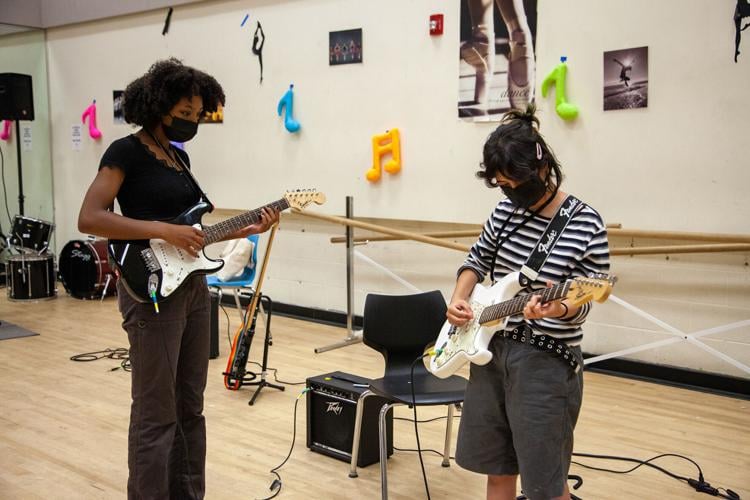
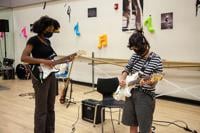

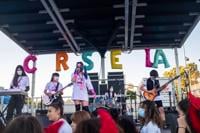





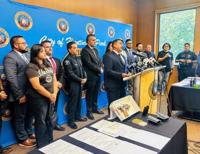

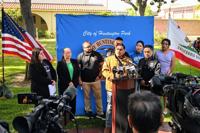
(0) comments
Welcome to the discussion.
Log In
Keep it Clean. Please avoid obscene, vulgar, lewd, racist or sexually-oriented language.
PLEASE TURN OFF YOUR CAPS LOCK.
Don't Threaten. Threats of harming another person will not be tolerated.
Be Truthful. Don't knowingly lie about anyone or anything.
Be Nice. No racism, sexism or any sort of -ism that is degrading to another person.
Be Proactive. Use the 'Report' link on each comment to let us know of abusive posts.
Share with Us. We'd love to hear eyewitness accounts, the history behind an article.